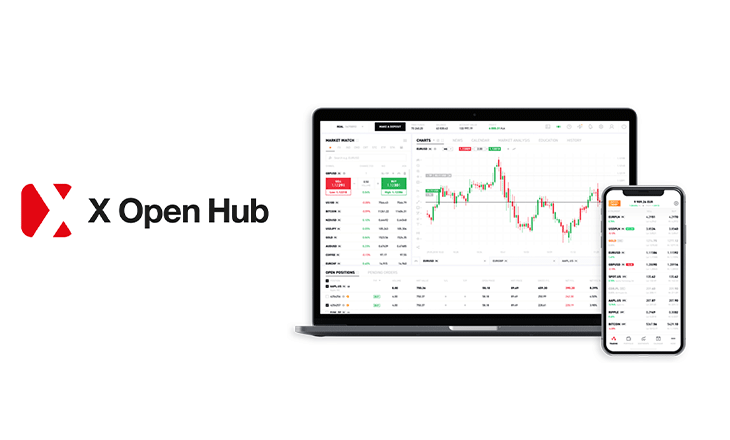Jan Kotowski, X Open Hub’s International Business Developer, is a financial market enthusiast and individual trader with over 11 years of experience.

Jan Kotowski, International Business Developer at X Open Hub
His further career lead him through proprietary trading in OSTC and expert positions in various industry leading international financial firms. Before joining X Open Hub as international business developer, Jan was deputy branch director of another brokerage in Poland, responsible for media presence, promotion, educational offer and customer support.
Jan joins LeapRate today to discuss the year ahead for X Open Hub, key traders’ demands in 2019, retail trading industry and more.
LR: Compared to 2018, how successful was 2019 for X Open Hub – what has changed, what you’d like to leave behind?
Jan: Well, answering this question is not easy for me, as I am new in the firm – I’ve joined the International Business Support team on the 2nd of January. However, I have already learned that we are a very dynamic company in terms of expansion and development of our products.
For example just in last year we have made new partnerships with businesses from Australia, South Africa and Indonesia, including banking institutions, which makes us particularly happy. Their trust in our liquidity and technology solutions shows clearly that we are a solid and responsible partner.
At the same time we have not forgotten about our current partners, whose requests are constantly answered with new developments of our core products. It is safe to say we grow together. What is more, even our ex-customers appreciate this attitude and after a brief switch to our competitors offering, are coming back to us, being happy that our doors are still wide opened.
I do observe that our additional services provided not only in 2019, but throughout the whole history of X Open Hub are possible to be delivered thanks to robust network of contacts with technology providers, lawyers and advisors who help our partners with all business processes. In addition to that we are also preparing a very attractive reseller program.
LR: What were the key traders’ demands in 2019?
Jan: Of course, because of American-Chinese trade war, we’ve seen very violent volatility spikes that hurt retail customers, thus the need for more stability was loudly heard. On the other hand, we have a strong growing equities market, which attracts traditionally forex oriented investors to indices CFDs. Those assets are especially interesting for long term traders, but also typical day traders and scalpers had tons of opportunities to gain from larger swings of 2019.
In recent years most of the market newbies were attracted to trading because of the 2017/2018 cryptocurrencies boom. After its diminishing, a large group of customers started to look for other attractive and less-risky investments. This trend, characterized by a new generation of traders, who are not afraid of exotic instruments, but also not eager to spend whole days in front of screens, tracking prices or analyzing reports, is still strong. At the same time appetite for exponential profits is always on.
In X Open Hub we answer all those needs by assuring top quality liquidity, very attractive trading conditions and constantly expanding offer, including CFDs on non-traditional equities like ETFs for example, to our institutional partners. All of those can be easily accessed and traded on-the-spot on our award-winning web, stationary and mobile XOH Trader platform.
LR: According to you, what has changed for the retail trading industry in 2019, and what to expect in 2020?
Jan: Definitely, further impact of ESMA intervention is widely seen. In developed markets, we can observe consolidation of the whole CFD brokerage industry. At the same time, a substantial amount of customers switched to non-EU regulated or offshore brokers. That was a trigger for most of European firms to look for expansion outside the old continent. Main areas of interest are of course Asian markets, but also South American and African countries. Year 2019 was also a brief moment of renaissance for Australian firms, but it is heard everywhere that ASIC plans to introduce even stronger restrictions than ESMA, including max leverage cutting – main factor attracting retail customers. Where will they move is the next big question everybody is asking.
LR: What upcoming trends do you see emerging and making an impact on the industry in the next few years?
Jan: Our services are worldwide and we already have successful relationships with partners from almost every continent. We are continuously looking to expand our co-operations portfolio and seeing vast fields of business areas, where we could place our corner stone couldn’t make us happier. From Macau to London, on every fairs we are present, we see expanding fin-tech services. Those connected with investments, couldn’t function without core business of securitization and technology for liquidity, client accounts and sub-partners management. Those are main qualities of services & products X Open Hub development teams focus on. With constant improvements and updates, that tend to appear every month, as answer to our partners requests and needs, we are providing excellent standard of delivery, resulting in final satisfaction of their retail customers.
We notice that our business becomes more & more competitive, which is good for the whole industry, as it brings better trading conditions and even better solutions for global business and whole sector integrity. However in our research, we don’t see similar companies with such comprehensive offers as ours, aiming to make new partnerships with mid-size businesses, which is our great advantage.
Our largest competitors focus on providing resource-heavy solutions for the biggest players on the market. On the other hand smaller firms aim to newly created, non-regulated offshore brokerages providing them with old standardized products. At the same time flexibility that comes from our internal structure , allows us to present bespoke solutions, perfectly fitting needs and budgeting of those mid-cap companies.
LR: How will Brexit affect the retail trading industry?
Jan: As an individual trader I think first about increased long term systematic risk. Whether it will be regulatory or business risk, doesn’t really matter from this point of view, what counts is stability. On the other hand, as professional I can assure that business continuity will not be impacted by anything other than black swan event, that would hurt the whole system anyways.
FCA is known for its solidity, London Citi that hosts all great banks and other investment firms is, and what is more, gets a chance to become an even better place to run financial business. New legal and tax differences that will arise with time, will only increase competitiveness of those firms. At the same time, there is no other industry opened for globalization as much as finance. Thus, door shutting is definitely not an option, which means individual traders have nothing to be worried about.
Companies of course, will have some additional workload with adjustments to new reality. Besides that consolidation and further professionalization of the industry might slightly accelerate, if only the legal environment will be simplified, which would certainly support M&A processes. Doubtful deregulation in this field, might also allow faster setup of new businesses, but because of earlier mentioned homogenization of the whole financial sector, including brokerages, market entry barriers in the UK will be relatively high.
LR: What platform providers as X Open Hub should be doing to better meet buy side demands?
Jan: Through years of my professional career I have worked with all kinds of trading tools, from great data harvesters like Bloomberg or Reuters terminals, through proprietary platforms like those offered by CQG or Stellar, to all kinds of retail aimed desktop and mobile apps.
One common thing for all this software is the need for simplification. We live in times where there is no place in schedule, to learn how certain software works. With all machine learning, neural networks or behavioristic patterns used almost everywhere, the human mind becomes too slow to keep up with all the changes. I believe that all future software and hardware design should aim to be as intuitional, as possible. With constantly increasing information flow, we find ourselves in flood of content, not necessarily important or useful. In such a crowded market, there is only place for products that will be obvious to use, but also not poor in function or design. It is a very demanding challenge, especially in our industry, where retail traders want everything now and at once.
Recently I did research on white label mobile platforms provided by X Open Hub and other technology providers, that perfectly picture how hard it is to complete this task. Beside only one competitor, our XOH Trader is the best choice in terms of intuitiveness/stability/richness of function/speed. Of course there are far more advanced platforms, even for mobile devices, but they all fail miserably on devices with less than 6 gigs of RAM. How many smartphones/tablets support this amount of memory? Less than 5% of the market…
On the other hand there are much lighter, super simple apps. But what, if they won’t allow you to trade from chart or will force you to open web browser and go for another service to check market calendar/news? Will it really be reliable, easy to use and fast? Ultimately will those platforms let you trade on the go?
LR: Let us know more about your enforcing XOH business team.
Jan: My role in the team is international business support. Using my previous experiences from the finance industry, where I developed processes, trained and managed teams in complaints handling and customer support, my goal is to assure our partners they are serviced with top notch quality and provide them with such good overall experience, that they will recommend us to their friends and business acquaintances.
I believe that a good relationship is based on people that build it. I am giving my best when I am helping our partners, and I hope it will come back to us, creating plenty of win-win situations.
The best bonds are created by people who share the same passions or have mutual goals. This is exactly the situation with our partners at XOH.
LR: Upcoming plans for 2020.
Jan: We have already completed operational planning for the next six months. As a result, we have created a solid customer-oriented plan that will help us to further expand our offer and business processes. Our development framework will be based on four pillars:
International expansion – our public listed capital group plans to obtain further financial licenses. As a result, we will become even more transparent and respected in foreign markets.
Developing our offer – we are constantly growing firm, as is our liquidity offer. Soon, we will introduce to our partners new groups of instruments. We are also into the process of integration with the most reputable Aggregation Engine on the market, that will allow us to tighten our spreads, reduce execution time and limit the time needed for the integration.
Mobile platform development – we will put even more effort into the mobile platform development. Our internal teams of data scientists and UX specialists are constantly improving GUI and speed of our mobile solutions. We also plan to add new unique features and expand the branding options of our platforms.
Onboarding optimization – to meet the needs of our prospects and partners we are planning to partially automate our onboarding processes, however without the use of unreliable “blind” document checking methods. In addition, we are also improving our customer support mechanisms to better understand requirements and concerns of our clients.
More news from XOH can be seen below:
